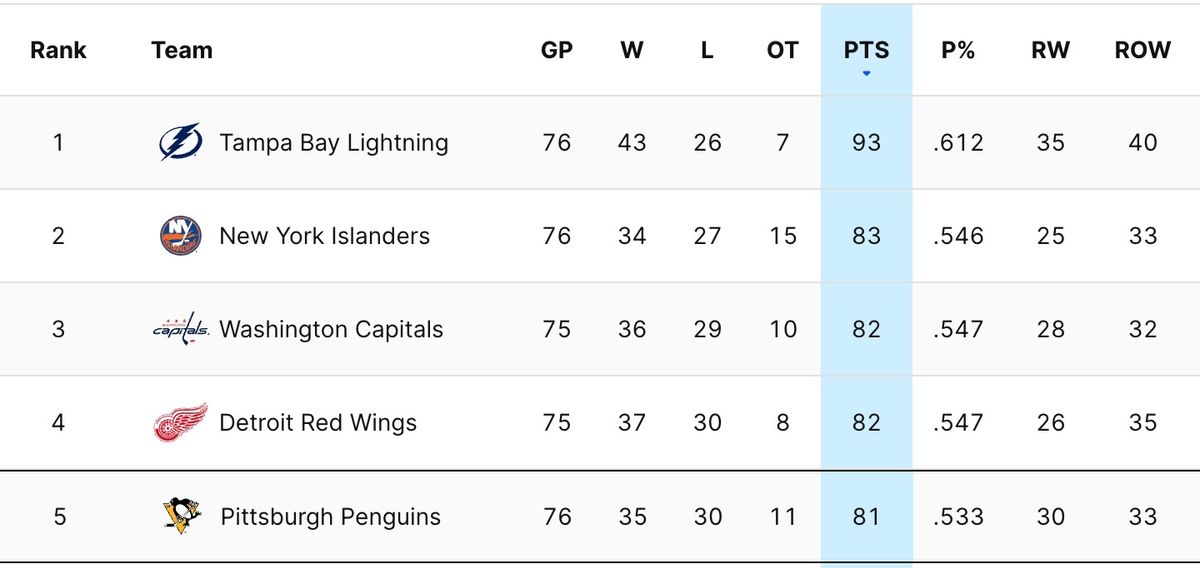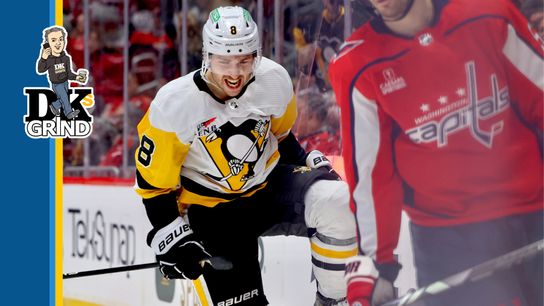WASHINGTON -- Nothing's changed, certainly not schematically.
And yet, everything's changed.
I mean, there'd be sequences, there'd be whole shifts, there'd be, really, all 60 minutes of the Penguins' 4-1 flattening of the Capitals on this Thursday night at Capital One Arena, where I'd remove my glasses, rub my eyes, then double-take at what I was watching.
A blink-and-you'd-miss-it sampling:
— DK Pittsburgh Sports (@DKPSmedia) April 5, 2024
That's Sidney Crosby tracking back with the two-goal lead and 10 minutes to go. He outmuscles Aliaksei Protas, Washington's 6-foot-6, 225-pound winger, for the puck. He lunges with a single hand to swat it ahead to nearby Bryan Rust, who delivers the deftest of touches to feed Drew O'Connor charging across center red to start -- what else? -- his own human forecheck at the far end.
Watch that a hundred times, and I'll promise it'd be even prettier with the 101st.
"It's fun, man," O'Connor would tell me at his stall after most of the visiting locker room had emptied out. "When you're playing hockey like that, when you're in sync like that, when you just kinda feel that everybody's supporting each other, there for each other ... that's fun."
That was the end of our talk. Or so I'd thought, as I'd gotten up to go.
"Hey," he'd say to turn me around, "what'd the Islanders do?"
____________________
Oh, right. That. Let's not forget why any of this still matters:

NHL
Those are the Eastern Conference's wild-card standings, from which two Stanley Cup playoff participants will emerge. Equally important though not pictured, the Flyers, the Metropolitan Division's third-place team, are now tied with the Islanders -- who were 4-2 winners on this night in Columbus, Ohio, by the way -- at 83 points apiece. So, mathematically, that current Philadelphia position's just as much of a target for the Penguins as the wild card.
Plain and simple, they're two points back.
And breathing, as opposed to what they'd have been if this outcome went the other way.
“I couldn’t be happier for the players," Mike Sullivan would say. "They’re competing. They’re battling hard. It’s not perfect right now, but I love our energy, our enthusiasm, our compete level. It's been fun to watch. I've certainly been proud of them for the last little while."
A clear reference to ongoing 5-0-1 surge, including this now-complete 3-0 Metro sweep of the Rangers, Devils and these Capitals who'd opened the day three points up on the Penguins.
"We're just trying to dig in and give ourselves a chance," he'd continue. "That’s the conversation that we’ve had. We’ve tried to just stay in the moment and stay focused on one game in front of us, and we’ll see where it takes us. We’ve got ourselves in the fight, so to speak. Now, we’re looking forward to the next opportunity.”
That'll come Saturday afternoon at PPG Paints Arena against the Lightning.
"Everybody knew the stakes in here," Rust would say of this setting. "I thought we played really hard. I thought we had a really good effort. We had a really smart game where we were good defensively, didn’t really give them much.”
No, they didn't. The Capitals wound up ahead in shots, 31-24, but registered one official high-danger scoring chance at five-on-five after the first period, that coming on Alexander Ovechkin's point-blank goal early in the third. Otherwise, the bulk of what Washington would send Alex Nedeljkovic's way required extra postage. Bunch of pointless perimeter flicks that he'd either handle with ease or ho-hum cover with even greater ease.
Didn't give them much, indeed. And that's now a trend, too, with the Penguins' opponents over this six-game surge having been held to 13 goals.
Nedeljkovic was asked by a Washington reporter to what he'd credit this run and, though the answer's lengthy, I can't bring myself to cut a single syllable.
"The guys in front of me," he began. "The guys in front of me, this whole trip, have been incredible. That was a tough back-to-back in New York and New Jersey. We beat one of the best teams -- top three team in the league --in New York in their barn. Then, we gotta get on the bus, go to a new hotel, play in New Jersey a team that we're fighting for points with, and that's got a lot of firepower up front, a lot of speed. And we found a way to win that game. We came back in the third period. Tonight, same thing. Another team we're fighting with, we're chasing, a lot of firepower, obviously. And we just played an unbelievable game. Maybe the first 10 minutes, we were trying to find our legs a bit. But after that, we took it to them. Second period, we were all over them. Didn't give them a sniff. And then, in the third, they didn't really get much other than on a five-on-three. They might've had a lot of possession, but they didn't really get anything out of it. I think we did an unbelievable job shutting them down."
He glanced around the room before finishing, "All four lines. All six defensemen. Everybody's played huge roles this whole trip, and we needed it."
Shutting them down. All four lines. All six defensemen.
You know, my friends, it's high time we all had a real talk about that.
____________________
I entered that room with a primary purpose: Find out where all this defending originated.
Who lit the fire?
When exactly was it lit?
Where the hell had it been hiding for the better part of six months?
But first, I approached Sullivan after his standard postgame session to affirm, as my eyes had been telling me, that nothing about his long-standing system had been altered in any way.
"No," he'd reply. "Not at all. We're just playing better."
To which he'd smile and add, "Give the players credit. I'm happy for the players."
All right, then, but all of the above questions would still persist, at least beyond whatever credit would go to Sullivan and his coaching staff for sticking by that system and, of course, ensuring that the team's objective remained visible even after an entire city had left that for dead. (I'm no exception, having penned a premature obituary from Newark two weeks ago.) So that only addressed one potential slice of the equation.
And I didn't mess around, going to three players I've learned to trust in good and bad times to shoot straight: How'd this happen?
“Tough to say," Marcus Pettersson would reply. "I think we really found something on this trip. We played some tough teams. We didn’t get the result we wanted in Columbus. The third period, we didn’t like."
"So," he'd add, "I think everybody dug down and decided we'd defend as a five-man unit.”
“I don't have a good reason for why we didn't have it before," Lars Eller would reply after his empty-net goal marked his 400th career point. "I think we had it at stretches during the season, and then, all of a sudden, it kind of disappeared on us in February and March. And I don't have a good explanation for why we got away from that for so long. But I had confidence the whole time that we still had that game within our team."
He did, too. He might've been the only one.
"Maybe we just really needed to get our backs against the wall and know that there was no other way out than being committed to playing a really good defensive game. Because the other way wasn't working."
“I think team defense has been one of our strengths all year," Erik Karlsson would begin his own reply, which he was forced to reset by my right eyebrow rising up.
"OK, I think we had obviously a period there where we didn’t play very good hockey. Our defense game was part of that."
Much better.
"But I think, for the most part, we’ve been a fairly consistent, defensive-structured, good team. And we’re getting some easy goals now, too."
That's what I get for having distracted him. Because that last sentence was friendly fire aimed at Michael Bunting passing by.
So, as long as we're distracted, here's how the 3-0 lead was built:
— DK Pittsburgh Sports (@DKPSmedia) April 4, 2024
— DK Pittsburgh Sports (@DKPSmedia) April 4, 2024
— DK Pittsburgh Sports (@DKPSmedia) April 5, 2024
Bunting's slap shot, just above, was a Randy Cunneyworth special for those who go back several decades, just gripping and ripping out of knowledge that the goaltenders weren't wearing anywhere near as much equipment as ... well, Charlie Lindgren would on this night.
After a couple more barbs were exchanged between Karlsson and Bunting, the former proceeded, "I just think we know what we are. Or remembered what we are. We have to play good defensively. In our D zone, I think, we’re really good. The neutral zone, I think, it’s hit or miss. But once we get in our D zone, I think we’re very predictable to each other.”
Predictable, but in the good way.
Maybe it's some of that. Maybe it's the new kiddie D-pair of Ryan Shea, whose goal here was his first NHL point, and Jack St. Ivany, who again was so sharp that ... eh, I'm biting my tongue on this for now. Maybe it's the additional reliance on youth up front, with O'Connor having remarkably led all forwards with 19:08 of ice time. Maybe it's Evgeni Malkin having rediscovered his 200-foot game in a big way. Or maybe it's something as academic as a collective feeding off a goaltender, a hockey tale as old as those involving dog sleds.
Heck, maybe it's all of that.
Whichever the case ...
"We have belief and confidence in each other, and we just keep trying to stay alive," Eller would say. "No quit in here."
Not at all predictable, but also in the good way.
• The Pirates took two of three from the Nationals right down the road from this place, they're now 6-1, and I'll be hurrying back to cover the home opener Friday. No shortage of entertainment these past few days, huh?
• Thanks for reading.
• And for listening:


